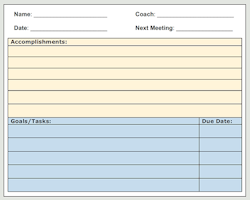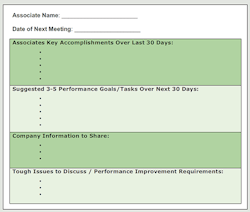A New Game Plan for Performance Reviews
In our consulting work with HVACR, plumbing and electrical distributors, manufacturers and independent reps, over the last 30 years, we continue to find what Jack Welch, the former CEO of General Electric, once said continues to ring true: "The biggest cowards are managers who don't let people know where they stand."
Most distributors, manufacturers and reps fall back on an annual performance appraisal process with the objective that their managers can effectively evaluate their employees' job performance. Annual employee performance reviews do not work. Once-a-year-only employee feedback, the scoring and ranking, discussing performance goals and one-size-fits-all annual forms are useless.
However, eliminating annual performance reviews in and of themselves is not the answer. Whether you are a distributor, manufacturer or rep, you need to replace ineffective performance review methodologies with a culture based on high-performance coaching that includes monthly, honest feedback for each and every employee.
HVACR distributors, manufacturers and reps that have kicked old-style annual performance appraisals to the curb and retrained their managers to give continual performance feedback through monthly high-performance coaching sessions achieve both higher employee productivity and employee satisfaction.
Granite City Electric Supply, the largest family-owned electrical distributor in New England with 28 branch locations, is a good example of a distributor who conducts high-performance coaching. We helped the company develop a new performance appraisal system.
According to Steve Helle, the company's president and CEO, "Tom O'Connor pressed me pretty hard to show what methods were being used to give direction, provide feedback and convey strategies to our employees. He introduced us to a simple, one-page coaching form that we use to this day. The coaching objective throughout our organization is that all managers are to coach their direct reports every four weeks. The coaching objective is to drive a culture via agreed-upon goals to achieve the company's overall strategy through the monthly coaching sessions.
"The coaching process usually starts with a quick review of the last coaching session. As a general rule, the objective is to move the goals to the achievement section at the top. The more you move to the top, the more you have an opportunity to celebrate, give credit where credit is due and see progress.
"Conversely, it gives you specific tracking on assignments that don't get done. When this happens, it's the manager's job to question direct reports on the resources they need that will allow them to hit their goals. The coaching process for me is simply invaluable. It satisfies my need for a significant amount of detail, keeps me organized, and gives me the opportunity to quickly see where an employee's skill set will be of benefit to our company. It gives us an opportunity to celebrate or raise an issue of concern quicker."
What is High-Performance Coaching?
High-performance coaching is a performance management partnership between managers and their employees. When done right, it's a collaborative goal-setting process. You listen to each other, review results that were achieved or exceeded and then ask questions, share views and negotiate solutions upon reviewing results that did not reach performance expectations. Managers are responsible for the following:
- Developing and communicating their performance expectations and priorities to their employees.
- Accepting input from their employees about these performance expectations and adjusting all of them as appropriate.
- Observing employee behavior and results and providing continuous feedback on performance.
- Acknowledging achievements and working through obstacles that inhibit goal attainment.
- Conducting a monthly high-performance coaching session with employees and providing them with actionable feedback.
To help you track your success in accomplishing these goals, use the monthly coaching report below.
3-Step Coaching Process
There are three major phases to the coaching process: preparation, discussion and follow-up.
Step 1: Preparation. There are two forms of coaching – informal coaching and formal coaching. Informal coaching occurs in the moment, at any time. It can occur in person, on the telephone, or through email as a quick follow-up or check-in. During informal coaching, you can immediately acknowledge a success, deal with a performance issue, train on a process, or follow-up on a deadline. Informal coaching serves as a platform for formal coaching.
To prepare for each formal coaching session, keep notes about every employee's job performance. Write a discussion guide of the things you want to cover in your coaching session, including a listing of accomplishments, performance goals and action tasks. Require each employee to come to the coaching session with a discussion guide that lists accomplishments, performance goals and action tasks. In addition, construct an overall coaching checklist that every manager can use with every employee to ensure that all coaching discussion steps are covered:
- Review previous actions: goals/ tasks.
- Move goals/tasks to accomplishments.
- Elicit and record other accomplishments.
- List new performance goals/tasks.
- Review individual employee performance scorecards.
- Provide company communication.
- Discuss training needs.
- Discuss any tough issues.
- Ask, "How can I be a better coach to you?"
- Schedule next coaching session.
For every formal coaching session, bring three coaching tools with you: the coaching checklist, as described above; the Coaching Report (using the form on the next page); and a discussion guide, which contains a list of the topics you want to discuss and a list of the topics your employee wants to discuss including accomplishments, performance goal progress and action tasks.
To be filled out by the Coach
Step 2: Discussion. Lead off every coaching session with positives. Exchange discussion guides. Start off by listing the employee's accomplishments from both discussion guides on the coaching report. Next list goals with due dates on the coaching report from each of your discussion guides. Check off each item from your discussion guides as you discuss it in your coaching session, and review your previous coaching report. Check off completed goals, and move them to accomplishments. Move incomplete goals to the new coaching report.
Through the coaching session, foster a collaborative problem-solving partnership. When a problem arises, work together through your coaching process to identify the specific problem and agree upon the step-by-step solutions. Effective coaching requires asking open-ended questions such as the following:
What was your greatest frustration and biggest challenge this month? What was the most exciting, fulfilling or successful achievement? How are you feeling about your current position/career with this company? How could I be a better coach?
In addition to asking questions, key coaching skills include active listening, providing constructive feedback and knowing how to stretch employees without causing them to fail. Active listening requires listeners to understand, interpret and evaluate what they heard.
During a typical coaching session, people often are not listening attentively to one another. They may be distracted by other events during the day, or thinking about what they are going to say next. Active listening is a discipline, and each party can help the other become a better active listener. Candid discussions about career satisfaction and personal development are an important part of the coaching process. These discussions can have a profound effect on loyalty and performance while strengthening and building trust between the coach and the employee. Seek opportunities to assist employee development through special assignments or projects that provide increased responsibilities.
Step 3: Follow-up. The manager completes the coaching report, provides a copy for the employee, and schedules a follow-up coaching session with date and time. Then the manager checks on progress weekly, gathering feedback on what's going well and what's not going well. The manager should reinforce positive progress and develop alternative action plans when progress is not going well. After every coaching session, ask yourself two questions:
- What worked well?
- What might you have done better?
When you get right down to it, high-performance coaching is the bulk of a manager's job. Performance management requires constant, thoughtful feedback and factual data on individual performance.
If your managers and employees set mutually agreed-upon performance goals and execute formal constructive coaching sessions, your employees will consistently attain or exceed their performance targets.
Tom O'Connor & TJ O'Connor, Farmington Consulting Group (FCG), www.fcgltd.com, work with HVACR, plumbing and electrical distributors, manufacturers, and manufacturers' representatives to design performance management processes that instill a high-performance work culture. They can be reached at 860/678-4402 or at their email addresses: [email protected] and [email protected].



